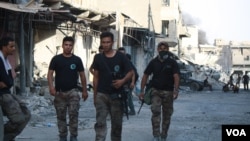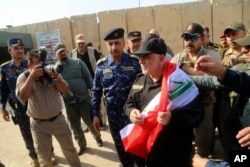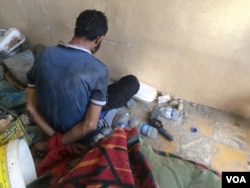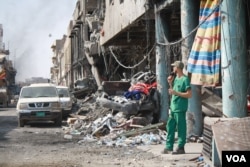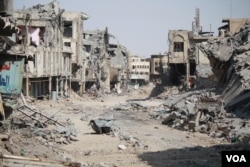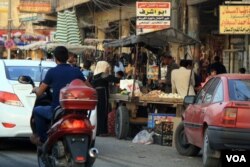Inch by inch, house by house, Iraqi forces continue to fight remaining Islamic State militants in Mosul even as officials celebrate victory. The battle is now in such tight quarters that coalition airstrikes against IS targets shake Iraqi-held buildings.
Soldiers described the final fights as the most brutal in the battle with Islamic State militants, as they entered houses where militants hide out in suicide vests.
As the sun faded in Mosul on Sunday, Iraqi Prime Minister Haidar al-Abadi’s convoy departed the "liberated city of Mosul." Some excited-looking locals gathered to commemorate his visit, their mobile phone cameras at the ready.
Fighting to the death
The vast majority of Mosul is controlled by Iraqi forces, with the militants penned inside an area of only about 200 square meters. Iraqi soldiers said the remaining fighters are zealots; most are not Iraqis, and for them every battle is fought is to the death.
“They shouted at us, ‘Get out of this Muslim land, infidels!” Barak Razaq, an Iraqi special forces soldier, said on the frontlines Sunday. “Then we saw them wearing suicide vests. We threw grenades at them and retreated and then called for an airstrike.”
Soldiers estimated there are between 100 and 150 IS members still fighting in Mosul, and said they are focusing now on taking as many of the remaining militants alive as possible. They expect the battle to end completely in the coming days, and then will move on to other cities and towns controlled by IS, in addition to fighting “sleeper cells” they believe are hidden among Mosul's civilian population.
“We are using a different kind of grenade now,” said First Lieutenant Mohammad Sahab, standing on a pile of rubble near the swollen body of a dead IS fighter. “They are meant only to wound.”
In a nearby house used as a makeshift base, three men sit against a wall with their hands tied behind their backs. They are rail-thin, and one man looks like he urinated on himself. Another appears to be silently praying.
Fighters pretend to be refugees
“These are Daesh,” soldiers said, using the pejorative Arabic expression for the so-called Islamic State group. “They say they are not, but our snipers could see them fighting. They only threw down their weapons and pretended to be refugees when they knew they would die.”
One of the men, Mashan, says he came to Iraqi forces because there was no food or water. He looks confused when asked if he supported IS when they arrived in his area. “They never gave us anything,” he said.
A few kilometers from the battlefront, the city is in ruins and teams of men search for the dead and the wounded. “This is a city of ghosts,” one Iraqi Army ambulance driver said, complaining that there are so many bodies to transport, it gives him little time to search for the living. The smell of death is everywhere.
“Even in six months, people won’t come back,” he adds before rushing off to show some men where there are civilian bodies to remove.
Thousands of civilians have been killed in this battle and 900,000 people have been forced to flee their homes. Vast swaths of Mosul and the surrounding towns and villages have been abandoned, and many people say they will never feel safe going home.
Will it ever feel safe again?
And while no part of Mosul is as thoroughly destroyed as the Old City, neither has any part been left untouched by nearly three years of IS rule and almost nine months of all-out war.
In parts of East Mosul, completely recaptured by Iraqi forces in January, recovery is more promising. Shoppers crowd the streets, some of which are newly paved, mostly picking through wreckage left by airstrikes. The government has restored electricity and water supplies in much of the city.
West Mosul is largely destroyed, but soldiers hope rebuilding will begin as soon as the battle ends.
“Just a few more days and we will have a party,” Lieutenant Sahab said as his soldiers fired at nearby IS targets. “We will go swimming in the Tigris River.”
Washington Institute for Near East Policy distinguished fellow and former ambassador James Jeffrey told VOA that relief and recovery efforts are only the first step after the recapture of Mosul.
"The second step is of course political, as always in Iraq," Jeffrey said. "How are you going to prevent a return of ISIS or something like it, and how are you going to incorporate the Sunni Arabs into the larger Iraq and keep the Kurds who are in it but quite separate playing a positive role. Those are the big issues we have been dealing with since 2003."




